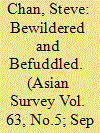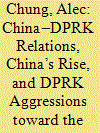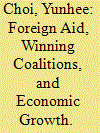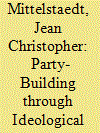|
|
|
Sort Order |
|
|
|
Items / Page
|
|
|
|
|
|
|
| Srl | Item |
| 1 |
ID:
192233


|
|
|
|
|
| Summary/Abstract |
I challenge the dominant Western discourse on China’s rise. This discourse tends to reflect political construction rather than thoughtful scholarship. It is poorly informed by historical evidence and usually evades comparison of China’s conduct with that of other countries, such as the United States, now or in the past. It is also characterized by strong tendencies of groupthink and revisionist scholarship to adjust to prevailing official policies and popular sentiments instead of scrutinizing their validity. This discourse is not only wrong but also dangerous.
|
|
|
|
|
|
|
|
|
|
|
|
|
|
|
|
| 2 |
ID:
192237


|
|
|
|
|
| Summary/Abstract |
This study investigates, using statistical analysis and case evidence, whether cooperative China–DPRK relations or China’s rise influence the DPRK to act more aggressively toward the ROK–U.S. Statistically, amicable China–DPRK ties have a positive association with the number of DPRK’s aggressive actions toward the ROK–U.S. The increase in China–DPRK’s material capability relative to that of the ROK–U.S. also positively affected this number. These findings are further supported through case evidence: China’s stance toward the DPRK before and after the sinking of the Cheonan in 2010, and the THAAD incident between the DPRK’s fourth and fifth nuclear tests in 2016.
|
|
|
|
|
|
|
|
|
|
|
|
|
|
|
|
| 3 |
ID:
192238


|
|
|
|
|
| Summary/Abstract |
COVID-19 generated significant anti-Chinese sentiment in South Korea. Domestic elite-level narratives regarding China at the pandemic’s onset were highly polarized: conservative parties advocated border shutdowns, emphasizing China as originating the virus, while progressive parties warned that this would incite xenophobia. Did these narratives shape anti-Chinese sentiment, and what are their foreign policy effects? Using social media data, I show that despite the polarized narratives at the elite level, attitudes of both conservative and progressive voters became unfavorable toward China following COVID-19’s onset. Furthermore, statistical analyses of survey data show that this blame is strongly associated with negative perceptions of China. Although substantively not directly linked to foreign policy, blame of China is strongly associated with rejection of foreign policy alignment with China and a shift toward supporting alignment with the US. These results have implications for understanding public support of South Korea’s foreign policy amid US–China bifurcation.
|
|
|
|
|
|
|
|
|
|
|
|
|
|
|
|
| 4 |
ID:
192235


|
|
|
|
|
| Summary/Abstract |
This paper examines the conditional effectiveness of foreign aid for economic growth. Theoretically, I argue that to maximize the chance to stay in office, the leaders of a large winning coalition will spend the aid money as intended, to provide public goods, which aids economic growth. On the other hand, leaders of a small winning coalition will spend the money on private goods, which is less effective for growth. To test this argument, I construct a panel data set for 28 Asian countries (1990–2010) and apply the generalized method of moments. I find that the interaction between ODA and coalition size significantly affects economic growth. Broadly, for large winning coalitions, growth rate increases with higher ODA, while for small winning coalitions it decreases with higher ODA.
|
|
|
|
|
|
|
|
|
|
|
|
|
|
|
|
| 5 |
ID:
192234


|
|
|
|
|
| Summary/Abstract |
Chinese Communist Party under Xi Jinping as part of an unfolding party-building project. Analyzing five campaigns conducted from 2013 to 2021, the study shows that they aimed to re-establish the linkage between the party center and party members, reinforce society’s connection to the party center, and crowd out competing narratives both inside the party and outside it. The article highlights the evolution of ideological campaigns in three phases, emphasizing how they developed from focusing on party members’ social environment toward positioning the party center and Xi Jinping at its core as the source of values and norms for party members and societal actors. The development of the party’s ideological campaigns under Xi Jinping thus has significant implications for the party’s model of governance, both internally and externally.
|
|
|
|
|
|
|
|
|
|
|
|
|
|
|
|
| 6 |
ID:
192236


|
|
|
|
|
| Summary/Abstract |
How can we understand the resurgence of Tehrik-i-Taliban Pakistan (TTP) in the former Federally Administered Tribal Areas (FATA)? Framing FATA as a Zomian space, we argue that its “friction of terrain” provided nonstate spaces for the emergence as well as the resurgence of TTP. The literature describes TTP as an outcome of global political and security compulsions, Islamabad’s regional policies, and ideological associations with the Afghan Taliban. The present study adds terrain to the discussion. Islamabad, after militarily destroying TTP, announced the FATA merger in 2018. However, TTP’s revival not only problematizes the state’s role but also affirms the continuation of Zomian character: the nonstate spaces that facilitated TTP’s ability to regroup and thrive again. James C. Scott’s Zomia framework is tested here against empirical realities with the help of both primary and secondary data sources.
|
|
|
|
|
|
|
|
|
|
|
|
|
|
|
|
|
|
|
|
|